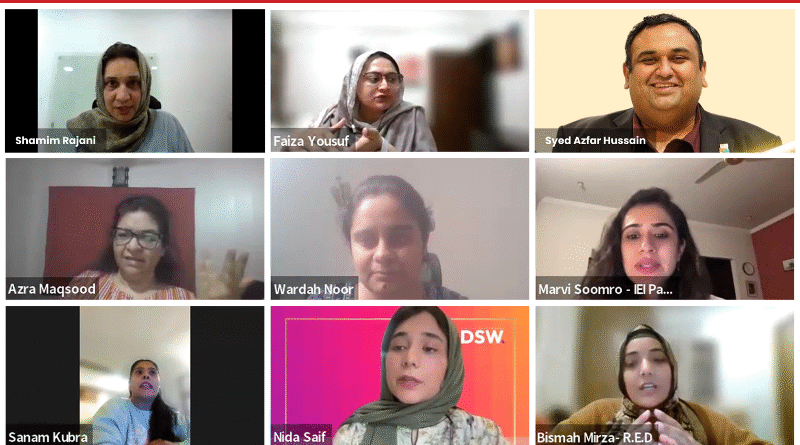From Hashtags to Action: Why Pakistan Needs a Collective Blueprint for Women in Tech
Every year on International Women’s Day, timelines flood with powerful stories, corporate campaigns, and hashtags promising a more inclusive future. For a day, the energy is electric — women’s achievements are celebrated, commitments to gender equity are declared, and tech communities join the global conversation.
But for many women in Pakistan, especially in tech, that energy fades as soon as the hashtags stop trending. Their reality looks very different: limited access to digital skills, scarce networks, cultural barriers, and workplaces that still struggle to make room for them.
So the question is — how do we move beyond symbolic gestures? How do we turn hashtags into real, lasting action?
That was the challenge CodeGirls set out to address this year.
A Conversation That Went Beyond Talk
To find answers, CodeGirls brought together leaders from some of the most impactful women-focused tech initiatives in the country — WomenInTechPK, CaterpillHERs, Digital Superwomen, Tech Sahelis, Pledges.Inc., Ascend Athletics, xWave, and NIC Karachi.
This wasn’t another panel discussion or a one-off campaign. It was a focused, solutions-driven dialogue about what’s working, what isn’t, and how we can do better — together.
What emerged from these conversations became the foundation of the white paper “Leveraging Collective Action for Women in Tech”, launched by CodeGirls on the Girls in ICT Day.
Who This Concerns
This isn’t just a paper for researchers or awareness campaigns — it’s a call to action for everyone shaping the future of women in tech in Pakistan:
- Program Leaders & Women-Centric Initiatives → to share resources, avoid duplication, and scale their impact faster.
- Industry Leaders & Employers → to co-design training and commit to inclusive hiring practices.
- Policymakers & Government → to build frameworks that support women’s participation in the digital economy.
- Educators & Universities → to align curricula with real-world skills and market needs.
- Funders & Donors → to move beyond short-term projects and invest in long-term, sustainable change.
If you fall into one of these groups, this paper speaks directly to you. Because creating equal opportunities in tech isn’t a side initiative — it’s central to building Pakistan’s economic resilience and future.
Why This Matters Now
Pakistan’s digital economy is one of its fastest-growing sectors. From fintech to e-commerce, from AI startups to global freelancing, technology is shaping our future. Yet women make up only 14-21% of Pakistan’s tech workforce — a stark gap that can’t be ignored.
This absence isn’t just a gender equity issue — it’s an economic one. A country cannot unlock its full potential if half its population is left out of its fastest-growing industry.
For women, joining tech means more than a job. It’s access to the global job market, financial independence, the power to support families, and the chance to break cycles of dependency. For Pakistan, it means building a workforce that’s innovative, resilient, and competitive on a global scale.
That’s why women-focused programs — whether they are teaching coding, entrepreneurship, freelancing, or even leadership in unconventional spaces like adventure sports — are not side initiatives. They are nation-building efforts.
And to succeed, they need support — from government, industry, investors, and communities.
What We Learned
The IWD Focal Group Discussion brought to light a wide spectrum of insights on women-centric programs — from operational challenges like infrastructural gaps, cultural resistance, and lack of awareness, to strategies that drive success and measurable impact.
What excites us the most, and keeps us motivated to push forward in this space, are the key impact metrics. For instance, CodeGirls invests an average of 392 USD per participant, and graduates have gone on to earn an average of 7,088 USD — that’s 18 times the initial investment. Numbers like these prove why women-focused tech programs are not just worth running, but worth scaling.
This white paper dives deeper into both the internal bottlenecks and external barriers these programs face, while also surfacing the solutions that have worked on the ground:
- Safe spaces matter → Girls-only labs and trusted online platforms provide the first step into tech for women in conservative regions.
- Community keeps women engaged → Mentorship, peer groups, and alumni networks are the difference between dropouts and graduates.
- Industry input pays off → Training programs built with employer feedback ensure women graduate with skills that land jobs.
- Funding models must evolve → Beyond short-term donor cycles, sustainable growth needs ESG grants, hybrid fee systems, and partnerships.
- Collaboration beats competition → Sharing resources, trainers, and curricula allows organizations to scale faster and reach more women.
These are not abstract theories — they are practical lessons, tested in classrooms, labs, and communities across Pakistan.
Why Collective Action Is the Future
For years, individual organizations have been fighting hard to push women into the tech pipeline. Some have succeeded in small pockets — producing graduates, freelancers, and entrepreneurs. But isolated wins can only go so far.
Real transformation requires collective action. It requires programs to collaborate rather than compete, employers to commit to inclusive workplaces, policymakers to design enabling frameworks, and donors to fund for the long term instead of chasing quick wins.
This is what the IWD White Paper lays out: not just the barriers, but the tested strategies and scalable models that can move Pakistan from hashtags to real change.
An Invitation
This white paper isn’t just a read. It’s an invitation.
If you’re an industry leader, a policymaker, an investor, or someone running a women-focused initiative, this is your call to action. The future of women in tech — and of Pakistan’s economy — depends on what we build together today.
Read the full white paper here → https://codegirls.consulnet.net/images/uploads/2025/4/911cd622-200c-4843-a37c-7db24e45f3e2.pdf
It’s not just a report — it’s a roadmap. A guide for anyone serious about empowering women in tech in Pakistan.
Together, we can move from hashtags to action — and from action to lasting impact.











